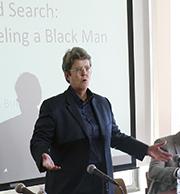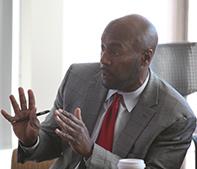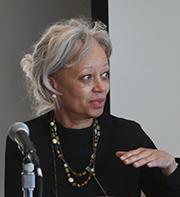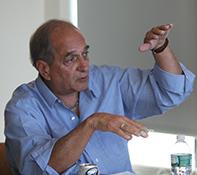Expert Panel Analyzes Stop-and-Frisk Policy Through Lens of Race and Gender
Columbia Law School Professors Patricia Williams and Jeffrey Fagan Discuss Consequences of the Controversial Policy with Georgetown Law Professor Paul Butler.
New York, September 26, 2013—The controversial policing tactic known as stop-and-frisk engenders fear, causes psychological damage,
and provides no significant benefit to public safety, according to experts who joined a discussion hosted last week by Columbia Law School’s Center for Gender and Sexuality Law.
| Professor Katherine M. Franke |
The September 18 panel, “EnGendering Policing: Stop and Frisk as Sexual and Racial Harassment,” was the first in the Law School’s interdisciplinary “Engendering Security” series, conceived by Katherine M. Franke, the Isidor and Seville Sulzbacher Professor of Law and co-director of the Center for Gender and Sexuality Law.
The event was held to address the implications of stop-and-frisk as a form of sexual and racial harassment. Participants were leading thinkers on critical race theory, criminal justice, and civil rights: Paul D. Butler, Professor of Law at Georgetown University Law Center; Patricia J. Williams, the James L. Dohr Professor of Law at Columbia Law School, and Jeffrey A. Fagan, the Isidor and Seville Sulzbacher Professor of Law at Columbia Law School.
Butler provided an overview of the consequences of stop-and-frisk, giving graphic examples and citing startling statistics. He explained, for example, that in heavily policed neighborhoods such as Brownsville, Brooklyn, the average African-American or Hispanic man is searched five times a year. Yet, of the 14,000 stops made in Brownsville annually, there are only about 100 resulting arrests.
| Professor Paul D. Butler of Georgetown |
“There is a need for a law enforcement intervention that actually works, but that doesn't appear to be stop-and-frisk,” Butler said, noting that crime in Brownsville has increased in some years.
The legal basis for stop-and-frisk was established by the U.S. Supreme Court’s 1968 Terry v. Ohio decision, which determined that a stop is constitutional under the Fourth Amendment as long as there is a “reasonable suspicion” that the person is involved in criminal activity.
The standard is so low for what defines “reasonable suspicion” that when a young minority man sees a police officer, sometimes it's not clear what he can do to avoid being stopped, said Butler, the author of Let’s Get Free: A Hip-Hop Theory of Justice, which received the Harry Chapin Media award.
| Professor Patricia J. Williams |
Williams, an expert in race, gender, and law, pointed out that monetary incentives for police officers contribute to the high number of stops. “Many of them don't feel it's the most effective way to do policing, but it pays better,” she said, adding that this creates a “mercenary” culture within the NYPD.
In a recent case, Floyd v. City of New York, a federal judge ruled that stop-and-frisk's “indirect racial profiling” is unconstitutional and ordered an overhaul of the NYPD’s tactics.
Fagan, a criminologist and an expert witness for the plaintiffs in the Floyd case, noted that stop-and-frisk has a psychological impact on minority men, with some studies finding high levels of post-traumatic stress disorder among those who have been stopped.
Butler argued that another often-overlooked issue is that the stops are incredibly invasive, and in most cases could be comparable to sexual harassment or sexual assault. “There’s something very “frisky” about stop and frisk,” Butler observed.
| Professor Jeffrey A. Fagan |
Still, elements of the Floyd decision might have a positive impact on the policy, Butler said, including the requirement for police officers in certain areas to wear cameras.
Fagan pointed out that footage of stops captured by bystanders could also play an important role.
“At some point you reach a tipping point of undeniability of what the image is saying,” he said.
The next event in the series is “Engendering Food Security,” with Olivier De Schutter, the U.N. Special Rapporteur on the Right to Food, scheduled for Oct. 21.



